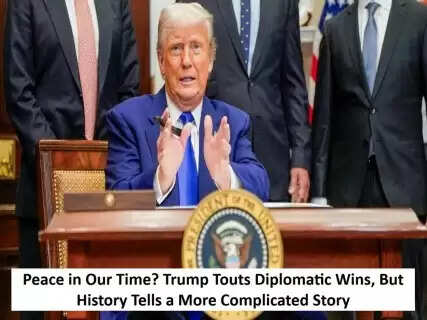
As the campaign trail heats up, former U.S. President Donald Trump is painting a picture of his time in office as an era of unprecedented global peace, directly contrasting it with the conflicts currently unfolding. Touting himself as a master dealmaker who kept America out of new wars, he points to his record as proof that his leadership brings stability. But does a closer look at his foreign policy record back up the bold rhetoric?One of Trump's central claims revolves around NATO. He frequently boasts that he single-handedly forced reluctant member nations to increase their defense spending by taking a hardline stance, even threatening to withdraw the U.S. from the historic alliance. While it's true that member contributions rose during his term, many analysts note this trend began after Russia's 2014 annexation of Crimea, long before Trump took office. Critics argue his disruptive tactics strained relationships with key allies, creating instability within the very alliance meant to ensure collective security.On the subject of major global adversaries, the story is equally complex. Trump points to his historic, face-to-face meetings with North Korean leader Kim Jong Un as a monumental achievement that cooled nuclear tensions. These summits were indeed unprecedented, breaking decades of diplomatic stalemate. However, they ultimately failed to produce a concrete denuclearization deal, and North Korea has since continued to advance its weapons programs. Similarly, while the world did not see a major new war erupt under his watch, the conflict in Ukraine was already simmering, and his often-warm relationship with Russian President Vladimir Putin drew heavy criticism.Perhaps the most significant and celebrated achievement of his presidency was the Abraham Accords. This landmark series of agreements successfully normalized relations between Israel and several Arab nations, including the United Arab Emirates and Bahrain, reshaping Middle Eastern politics. It was a genuine diplomatic breakthrough that bypassed decades of gridlock. Yet, even this success came with a caveat. The accords deliberately set aside the core Israeli-Palestinian conflict, an issue that has since erupted into devastating violence, proving that a wider regional peace remained elusive.Ultimately, Trump's foreign policy legacy is one of disruption. He shattered diplomatic norms, preferring personal relationships and high-stakes gambles over traditional statecraft. While he can rightfully claim credit for the historic Abraham Accords and for not initiating new foreign wars, his claims of securing "peace for the world" overlook the lingering conflicts and unresolved tensions that continued to simmer just beneath the surface.
Around the web

